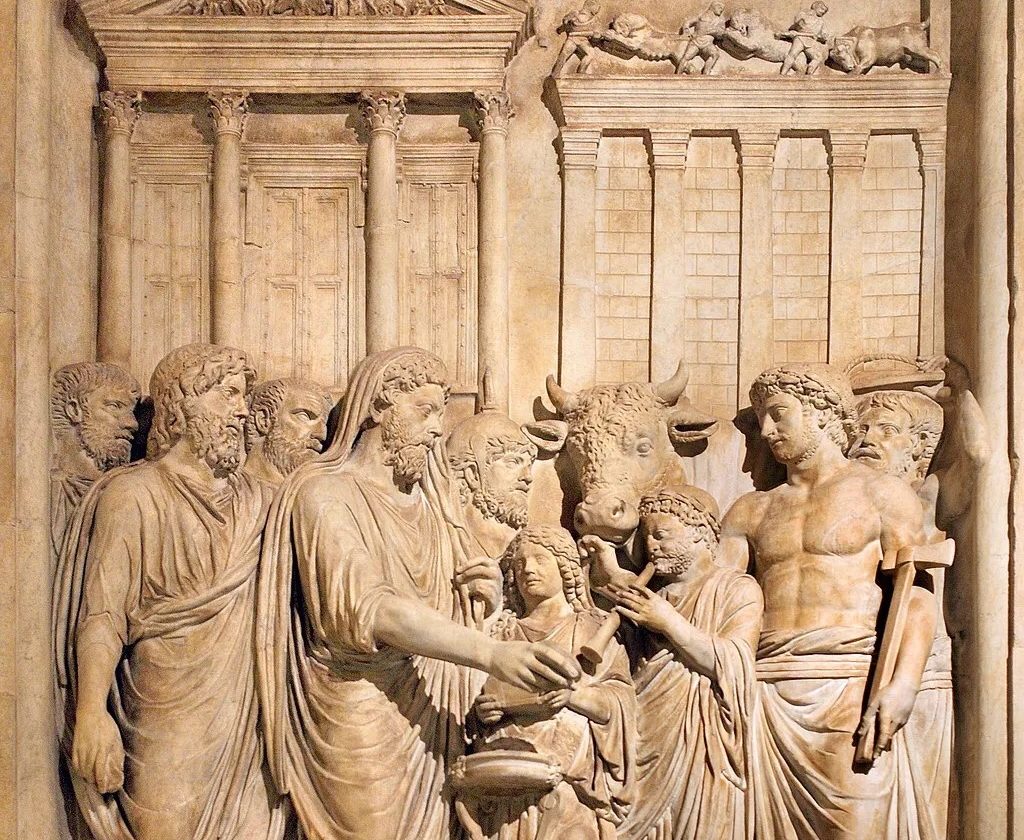
Dioses de los Hongos en la Antigua Roma Robigus
The Robigalia was a festival in ancient Roman religion held April 25, named for the god Robigus. Its main ritual was a dog sacrifice to protect grain fields from disease. Games (ludi) in the form of 'major and minor' races were held. The Robigalia was one of several agricultural festivals in April to celebrate and vitalize the growing season, but the darker sacrificial elements of these.

Robigus by ZeTrystan on Newgrounds
The Robigalia was a festival in ancient Roman religion held April 25, named for the god Robigus. Its main ritual was a dog sacrifice to protect grain fields from disease. Games ( ludi) in the form of "major and minor" races were held. [1]
Sack of Corinth(146 BCE) by Thomas Allom 1870 r/ancientrome
The festival of the Robigalia was celebrated on the 25th of April, and was said to have been instituted by Numa. 1 But considering the uncertainty of the ancients themselves as to whether the divinity was masculine or feminine, and that the Romans did not pay divine honors to any evil demon, it is highly probable that the divinity Robigus, or Ro.

Roman God Janus HighRes Vector Graphic Getty Images
Roman Agriculture God All things blight and beautiful He's an agricultural deity along with his wife Robigo. They don't have the most glamorous roles but they are very important. Their job is to ward off the parasitic little blighters that cause blight. Robigus Facts and Figures Name: Robigus Pronunciation: Coming soon Alternative names:

Roman Gods Wallpapers Wallpaper Cave Riset
This God protects against mould that can harm crops. Thus, this is an ancient agricultural festival. Its institution was attributed by Pliny to Numa. The cult of Robigus was attended by the priest of Quirinus (flamen Quirinalis) and Robigus likely had connections to the cult of Quirinus.

Antinous, The Roman God of Homosexuality YouTube
Zeus (Jupiter) God of lightning is very well known, as is Artemis (Diana), Hades (Pluto) and Apollo (who, for some reason, keeps the same name in both Roman and Greek mythology.) It's easy to see why people in ancient times would pray to these gods - pray to Hades to ensure your loved ones' safe passage in his kingdom.
Robigus The Roman God of Wheat Rust r/HellenicPagan
Robigus, Roman spirit of wheat rust. His festival (Robigalia) was on 25 April (Ov. Fast. 4. 901 ff. with Bömer's notes), at the fifth milestone of the via Claudia; the flamen Quirinalis (see flamines; quirinus) offered a red dog and a sheep, praying to avert the rust. The red dog of the July moveable festival *augurium canarium implies a.

Robigus The Roman God of Wheat Rust r/anthropomorphicfungi
Robigus Table of Contents Robigus Roman god Learn about this topic in these articles: fungi In fungus: Importance of fungi.Romans designated a particular deity, Robigus, as the god of rust and, in an effort to appease him, organized an annual festival, the Robigalia, in his honour. Read More

Sara Otterstätter Art & Illustration Neue Illustrationen Römische Götter/New Illustrations
The Romans designated a particular deity, Robigus, as the god of rust and, in an effort to appease him, organized an annual festival, the Robigalia, in his honour. Observe the importance of a mushroom's mycelium in the decomposition of organic matter The role of fungi in the decomposition of forest litter. See all videos for this article

Roman And Greek Gods Chart
Robigus was a relatively minor and obscure god in Ancient Rome who presided over diseases of wheat crops, especially the devastating fungal disease known as wheat rust. In Latin, the word "robigo" literally translates to "rust" (on both metal and crops). He was mainly invoked at the Robigalia festival, on April 25th.

Roman God Bacchus Costume Etsy
In Roman mythology, Robigus (" wheat rust" or "mildew") was a fertility god who protected crops against diseases. He was worshipped alongside his sister Robigo for over 1700 years. His festival was the Robigalia on April 25.

Roman gods, Janus, Gods and goddesses
Robi'gus (or fem. ROBI'GO) is described by some Latin writers as a divinity worshipped for the purpose of averting blight or too great heat from the young cornfields. The festival of the Robigalia was celebrated on the 25th of April, and was said to have been instituted by Numa (Varro, de Ling. Lat. 6.16; Serv. ad Virg.
This mosaic of the Roman God, Neptune, is from the 3rd Century AD and now house in the Musée
Description: The Robigalia was a festival in ancient Roman religion held April 25, named for the god Robigus.Its main ritual was a dog sacrifice to protect grain fields from disease. Games (ludi) in the form of "major and minor" races were held.The Robigalia was one of several agricultural festivals in April to celebrate and vitalize the growing season, but the darker sacrificial elements of.

Robigus The Roman God of Wheat Rust r/HellenicPagan
Robigus was a relatively minor and obscure god in Ancient Rome who presided over diseases of wheat crops, especially the devastating fungal disease known as wheat rust. In Latin, the word "robigo" literally translates to "rust" (on both metal and crops). He was mainly invoked at the Robigaliafestival, on April 25th.

Bacchus Roman God of Wine 2nd century CE (1) Roman gods, Roman statue, Greek and roman mythology
Robigalia was an old Roman festival in honor of the deities Robigo and Robigus, celebrated on April 25. Traditionally established by Numa Pompilius. According to the Romans, Robigo was a deity responsible for securing crops against the so-called grain rust that destroyed huge amounts of fields. During Robigalia, the retinue of the faithful went.
Robigus The Roman God of Wheat Rust r/anthropomorphicfungi
ROBIGA´LIA a public festival in nonour of the god Robigus, to preserve the fields from mildew, is said to have been instituted by Numa, and was celebrated on April 25th (Varro, L, L. 6.16; R. R. 1.1, 6; Fest. p. 267; Plin. Nat. 18.285 ). A procession was made to the grove of Robigus (or Robigo, according to Ovid and Columella), five miles out.